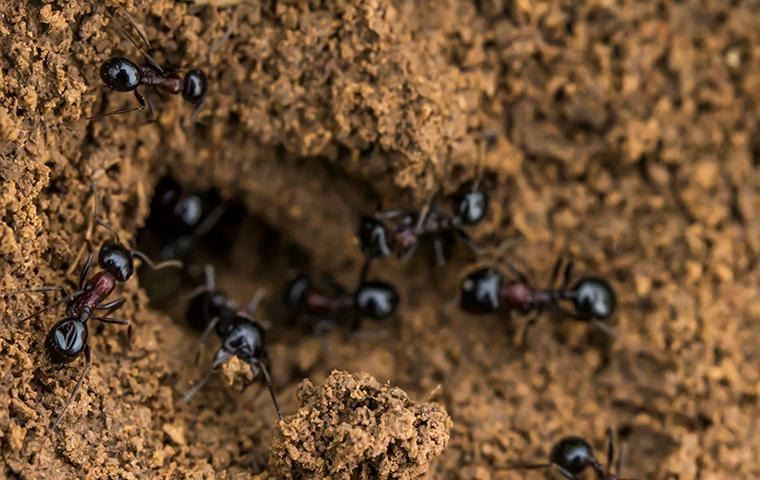
Say Good Riddance To Ants In Your Mooresville Home
Ants can seem like unstoppable pests—but are they? We have some good news for you. The only reason ants seem unstoppable is that most Mooresville residents don't know the simple steps that work to stop them. Ants are after one thing more than any other. Do you know what that one thing is? Food. Available food sources in your yard draw ants to your property, help them grow their populations, and as a result, they apply pressure to the exterior of your home. Indoor food sources can bring ants into your home in staggering numbers. If you know what ants eat, you'll know how to get rid of ants with natural methods. Let's look at how one ant is connected to a colony of thousands and how that one little ant can lead to one big problem. Let's examine the factors that cause ant infestations and look at how you can turn the table on those tiny pests. We'll end by sharing some smart ways a pest professional will apply ant pest control to get ants out of your home and keep them out. If you don't want to learn about ants and only want to rid your home of these frustrating pests, contact us for ant pest control in Mooresville. We're here to help you find professional solutions to your pest issues.

One Ant Usually Means More
An ant problem often begins with one tiny ant appearing every once and a while on interior surfaces. If you see an ant, you need to know that there are more—a lot more. Ants in Mooresville live in colonies. They aren't loners. If you see one ant frequently, it is a warning sign that you may have an indoor nest.
Whether the nest is indoors or outdoors, it is essential to perform an inspection. Follow the ant, look for other ants, and find ant trails. When several ants are following a trail, you can use that trail to track where they're coming in. If you find a gap where ants are entering and exiting, it is time to get out the caulking gun.
One little ant all by itself is likely a scout ant. It is wired to go off on its own away from the colony. It doesn't require the constant socialization that workers crave. What do we mean? Have you ever watched ants scramble around in a group on the ground? They are continually running into each other. They do this to groom each other and check for contaminants, a social behavior that helps them guard the colonies against threats. Scout ants leave the group and go off on their own, which you might interpret as bravery. These brave ants will go a surprising distance for their tiny size. But they always find their way home because they leave an invisible trail of pheromones. Let's look at this trail and discuss how one ant can amass an army.
How Little Ants Can Become A Big Problem
Some ants are as small as 1/32 of an inch long. They're tiny specks. But they live in colonies with hundreds of thousands of tiny specks that are able to gather together into a crawling swarm. If you've ever seen tiny ants crawling on top of each other and forming glob-like shapes, you know that ants can create a big problem even though they're tiny.
The first secret in understanding how to get rid of ants with all-natural methods is to consider this swarming behavior. Ants don't suddenly swarm. They are triggered to swarm. There are primarily two reasons ants will swarm.
Mating: Winged ants gather into a swarm to mate and reproduce. After mating, they shed their wings and attempt to make viable nests. If you see a mass of winged ants, that is a bad sign. It means you have a mature ant nest that is about to create several more nests. Keep watch for winged ants as a warning sign of ant problems.
Foraging: The most common reason ants swarm is to work together to collect a food source. For example, you may find a butterfly covered with ants. The ants will take the butterfly, piece by piece, back to their nest. It requires a colossal effort and the colony needs all hands on deck if possible. When you find a giant group of ants inside your home, it is likely that they've found a food source—though, there are some exceptions. Ants can enter your home during a heat wave, rainstorm, or when some other outside condition drives them to go into hiding. They may also enter your home in large numbers when they find a route, such as a branch touching your exterior wall near a window frame. But most of the time food is involved.
Since food and other factors can bring ants into your home from the outside, outdoor ant control is the first step in preventing indoor infestations. Let's break natural ant prevention down into a few simple parts.
Factors And Causes For Ant Infestations
The first step is to consider more closely the factors and causes that lead to ant infestations. We'll use what we've discussed so far and provide some specific examples. Then we'll add a few new facts we haven't looked at yet.
- If winged ants get inside, they may create a nest, depending on the species. An indoor nest will grow and mature inside a hidden void in your home as the ants feed on indoor and/or outdoor food sources.
- If a scout finds food in your home, it will lay down a trail that other ant workers can follow into your home.
- If a scout ant finds sugar water, like juice in the bottom of a cup or liquid in a hummingbird feeder, it will collect a droplet and lay a pheromone trail for other ants to come and collect droplets. They carry these little liquid drops on their backs like backpacks.
- If you have gaps in your exterior, ants will use them to enter your home.
- If you have tree branches or landscape plants touching your exterior, they will act as bridges for ants.
- If you have exterior food sources, you'll inspire ant activity near your home. A few common food sources that lead to ant problems are nectar, honeydew, decaying food in trash receptacles, and dead insects.
- If you have a moisture problem, it can attract ants in a few ways. Moisture problems often lead to aphid problems, and aphids create honeydew. Moisture can lead to fungus and mold problems, which are food for certain ants.
- Moisture is a requirement for many bugs, and ants eat bugs, particularly dead bugs.
Are you seeing a picture starting to form? Many of these factors are within your control. If you roll your sleeves up and apply the following ant prevention tips, you can turn the table on those ants.
- Repair window and door screens, replace weatherstripping, and seal gaps around frames to keep winged reproductives, worker ants, and scout ants out of your home. No gap or opening is too small.
- Keep your home as clean as possible to prevent ants from finding food sources.
- Keep food covered when you have a bowl sitting out on the counter.
- Put dirty dishes into a sink filled with soapy water.
- Store certain pantry foods in sealed containers to keep ants out.
- Move hummingbird feeders away from the exterior of your home and pick up cups, soda cans, bottles, etc.
- Trim all vegetation away from your exterior walls.
- Address lawn weeds and landscape weeds, particularly weeds that flower.
- Apply yellow sticky traps to capture aphids and check the bottom of leaves to remove any aphids you find.
- Manage your trash to reduce smells that attract ants, and keep all receptacles covered.
- Clean your gutters and trim your landscaping to reduce prolonged dampness.
- Take steps to reduce insects on your property. One way to do this is by keeping lights off at night, or by replacing white lights with yellow lights. Insects can't see yellow light and are not attracted to it.
These tips work naturally to stop ants and keep them away. But, home pest control for ants can fall short if you can't correct the conditions that inspire them to infest your home. When this is the case, professional service is the best solution because it targets colonies and arrests all activity.
The Most Effective Ant Control For Your Home
There are several ways your Lake Norman Home Services technician can help you keep ants out of your home. We inspect your property and consider ant pressures and conducive conditions. Based on our findings, we suggest targeted ant control solutions to eliminate colonies if necessary. Removing colonies requires sleuth work and a diligent application of trusted products and methods. Once ants are controlled, we work to keep them out of your home in two key ways. We address the pests that ants eat by applying spot treatments. We keep ants (and the pests they eat) from entering your home by routinely applying a barrier treatment.
Do you need ant control in Mooresville or a pest control service plan to keep ants and other pests out of your home? Contact Lake Norman Home Services. We'll help you find the perfect solution and get you on track to living an ant-free life.


Customer Reviews
-
“Lake Norman pest control does a wonderful job all around and even explained the safety concerns I had of the products for my new baby and dog.”- Lauren G.
-
“Lake Norman Pest Control has always been consistent with their service quality and more than fair with pricing.”- Michael C.
-
“He called me after the appointment and gave me a summary of the service and he made some additional recommendations.”- Leslie Z.
-
Jake promptly arrived and asked what issues we were having and quickly began applying treatment. He was professional and thorough. Very pleased with the service today.- Lisa C.
-
“Jake promptly arrived and asked what issues we were having and quickly began applying treatment.”- Lisa C.
-
“Lake Norman always does a great job in communicating and shows up at their committed times.”- Mike C.
-
“Michael has beHe and every representative we’ve worked with from this company have been very kind and good at listening to our needs. en super helpful! He's prompt, thorough, and responsive to all of our questions.”- Kimberly G.
-
“Our technician, Jake, has been very helpful. He has been on time and responsive to all my questions.”- Laurence P.


Why Choose Lake Norman Home Services?
-
Give A CrapDelight others by owning your role and saying yes. Take pride in how you appear & act & every other detail of the job. Be on time, attentive, & enthusiastic. Act as if the buck stops with you on every aspect of the job.
-
Chase PerfectionChase Perfection, knowing full well we will not reach it, but along the way we will catch excellence. Have a sense of urgency; Go-Forth Time - right now might be the only time you have to get it right.
-
Dig Deeper
Be an action-oriented professional that makes decisions based on evidence rather than stories & assumptions. Stay curious. Data can speak for itself.
Understand the cause of the fire rather than rushing to extinguish it.
-
Fight For SimplicityKeep it simple & consistent. Focus on how things should be done every time.
-
Face It, Fix ItConfront challenges directly and address issues head-on. A bias for action and powerful conversations drive our progress. It’s about getting it right rather than being right.
-
Grow!Growth is our purpose. Growing as people & growing our business.